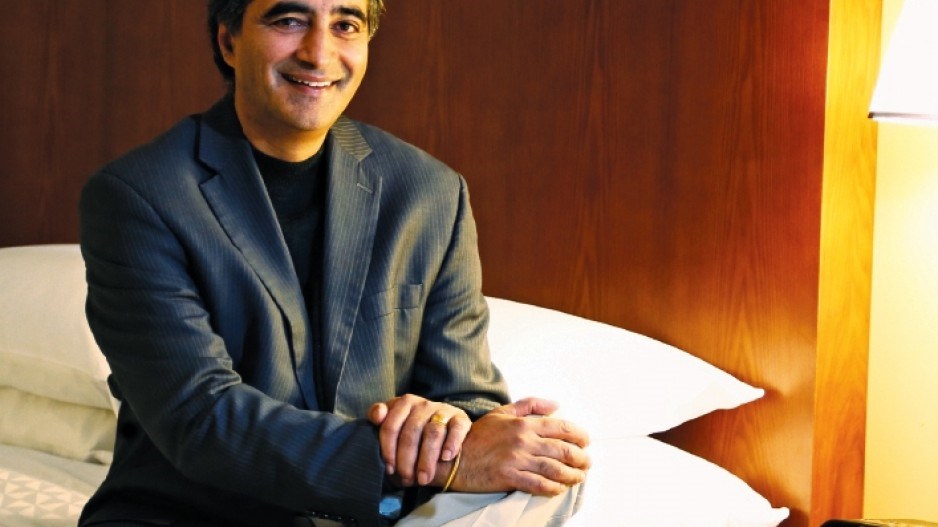When the NDP governed B.C. in the 1990s, few people in the province would have predicted that some of the party's most high profile and ardent left-wing ideologues would build successful free-enterprise careers following the party's near annihilation in 2001.
But that they have.
For example, former premier Glen Clark is now president of the Jim Pattison Group, B.C.'s largest private company, and longtime cabinet minister Moe Sihota, still heavily involved with the NDP, now co-owns a Victoria hotel and has a small stake in a golf course and residential development near Edmonton.
"Many people see it as incongruent that you can be a member of the NDP and be involved in business," Sihota told Business in Vancouver between bites of salad while sitting at a corner booth in a Cactus Club restaurant.
"It's something that, both politically and personally, we struggle with, but it's never struck me as incongruent."
His hotel does not even have unionized workers. They turned down a certification vote, Sihota believes, because he pays them well and has fostered a corporate culture that's positive enough that there was no demand for a union.
"Unions tend to do well when employers don't treat their people well, and we don't have that problem," he said.
Sihota is paid $72,000 annually for his part-time role as president of the provincial NDP. He also collects approximately $55,000 per year from his B.C. MLA pension.
Sihota left politics in 2001. He was 46 and realized that he couldn't simply retire.
Moses Znaimer, who then headed programming for media conglomerate Chum Ltd., convinced Sihota to be a TV host at Chum's New VI (now A-Channel).
Sihota also became a consultant in developing Alberta's Northern Bear Golf Club. Work for that project included everything from negotiating with golf great Jack Nicklaus for him to design the course to stickhandling government approvals.
Sihota said his aim in going into business was to "create equity to pass on to my kids."
Znaimer quit managing programming in 2003, and Sihota was bounced the following year when what he described as an "embarrassingly generous" contract expired.
Now 57, Sihota used his politi cal skills to encourage five investors to join him and buy land in Victoria's Langford suburb and build the Four Points by Sheraton Victoria Gateway hotel.
The area had new roads, schools, parks, an arena, a casino and other infrastructure, but Sihota said that no one had built a hotel.
"People would have family members stay at the hospital and have no place to stay."
Given that construction had started in mid-2004, Sihota expected the hotel to open in early 2007. But after a fire delayed construction, the admittedly superstitious Sihota had to push hard to succeed at opening on August 8, 2008.
The tanking global economy made for a rocky start, but Sihota said the venture has since turned profitable thanks to repeat business from corporate clients.
Clark told Business in Vancouver that Sihota has deep business roots.
"His dad [Bachittar Sihota] was an entrepreneur who owned a furniture store and was always in business, so he comes from a business family background."
Sihota started out as a social worker and then became a lawyer before becoming, in 1986, the first Indo-Canadian to be elected to a legislature in Canada.
He held eight different portfolios during the NDP's 10-year reign, even though he had to resign several times after becoming entangled in various scandals.
"He's a very entrepreneurial guy," Clark said. "He was when he was in politics as well. Sometimes that got him in trouble."
One of Sihota's resignations came after he wrote letters and made repeated calls to the Motor Carrier Commission inquiring about applications made by Herb Dhaliwal, a limousine company owner, good friend and former MP.
Sihota's cousin ran Dhaliwal's limousine company.
"There are two types of cabinet minister," Clark said. "Most basically do what the staff tell them to do. That's a slight exaggeration, but they basically represent the bureaucracy in cabinet.
"Then there is a handful, people like Moe, who actually try to run their portfolio and try to drive a change or an agenda."
Clark added that Cabinet ministers who have an activist streak are likely best suited for business.
"Regardless of whether you are the CEO or are in charge of a small division, you get to drive an agenda," Clark said.
"It depends on the company because some of them are more constraining, but, by and large, you get rewarded for performance."
Sihota has no ambitions to match Clark's business success. Instead of expanding his hotel into a chain, he's looking to wind down his activity and ease into retirement.
The recent death, at 53, of Sihota's longtime best friend sparked his desire to make the most of his life while he's in good health.
His managing director role at his hotel takes only a couple of hours a day, and his responsibilities as NDP president occupy a few hours a day on average.
He believes the NDP will form the government following next May's provincial election. After he helps the party transition into government, he plans to resign as president.
Sihota's children are both in their 20s and successful in their own right. Daughter Karina works at the Canadian Labour Congress in Ottawa; son Rajan works in social media marketing for rock bands in Victoria.
"I look at my mom, who is in her 90s, and I see the years when she had quality in her life," he said.
"Both my wife and I are into enjoying our life. We're in good health and want to spend time with the kids. So my business story is more of a sunset one than one of growth and taking advantage of new opportunities." •




